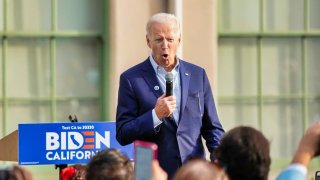Lower Interest Rates Won't Come to the Rescue for Joe Biden
In the run-up to this year’s presidential election, President Joe Biden, like previous incumbents, would like the Federal Reserve to cut interest rates. That seems unlikely to happen anytime soon.
In the run-up to this year’s presidential election, President Biden, like previous incumbents, would like the Federal Reserve to cut interest rates. It would not only boost financial markets but also signal that the Fed was confident that it had won the war against inflation. Unfortunately for Mr. Biden, today’s weaker-than-expected labor market report was not nearly weak enough for him to have any confidence that the Fed will start cutting interest rates before November.
Since July 2023, the last time that the Fed raised interest rates, Jerome Powell has been consistent in his monetary policy message. The Fed would not start cutting interest rates until it was confident that inflation was coming down to its 2 percent inflation target on a sustainable basis. He has also expressed disappointment that inflation is proving more resilient to the Fed’s interest rate hikes than had been expected. After coming down markedly from its July 2022 high of over 9 percent, consumer price inflation has been stuck at around over 3 percent for the past few months.
In the Fed’s view of the world, an important determinant of inflation is the state of the labor market. If the labor market is overheated and unemployment is very low, wages tend to go up, which translates into higher inflation. By the same token, if the labor market cools and unemployment rises, that puts downward pressure on wages, leading to lower inflation.
In his last press conference, Mr. Powell indicated that the labor market remains strong. Today’s jobs report does not materially change that picture. To be sure, the increase in employment moderated more than expected to 175,000 new jobs. However, that came after several strong months of job increases at 300,000. Similarly, while the unemployment rate did tick up to 3.9 percent, that level of unemployment is still close to its postwar low. One would think that such a low unemployment rate is not consistent with a sufficient moderation in wage growth to bring inflation down to the Fed’s 2 percent inflation target on a sustainable basis.
All of this leaves the Fed with little basis to cut interest rates at its next two policy meetings without jeopardizing the Fed’s inflation-fighting credibility in the markets. The prospects for an interest cut in the second half of the year would be complicated by the approaching November election. If it is not to be accused of political interference, the Fed would need to have compelling reasons to cut interest rates on the eve of an election.
Another vital reason that Mr. Biden should be worried is that the Fed is now having to keep interest rates high for longer. Those high interest rates could precipitate a financial crisis on the eve of the election, which is precisely what occurred in 2008 with the September 2008 Lehman bankruptcy.
This time around, the Fed’s high interest rates could trigger another round of the regional bank crisis. Those banks already have very large mark-to-market losses on their bond and loan portfolios as a result of high interest rates. They also have high exposure to the troubled commercial real estate sector. A warning sign that these banks could be in for real trouble before year-end is that commercial property default rates are now spiking. With some $900 billion in commercial property loans needing to be rolled over at very much higher interest rates than those at which they were contracted, we must expect to see a further increase in commercial property loan defaults.
James Carville, Bill Clinton’s political advisor, famously said that when it came to elections, “it’s the economy, stupid.” With little prospect of interest rate cuts any time soon and with inflation still running at more than 3 percent, Mr. Biden must be hoping that James Carville is wrong.
About the Author: Desmond Lachman
Desmond Lachman is a Senior Fellow at the American Enterprise Institute and was a deputy director in the International Monetary Fund’s Policy Development and Review Department and the chief emerging-market economic strategist at Salomon Smith Barney.
Image: Shutterstock.


